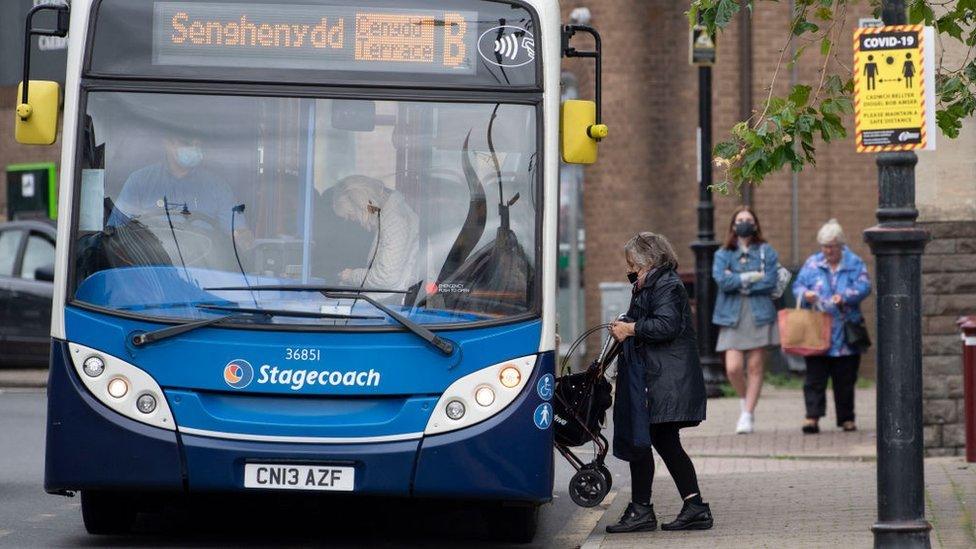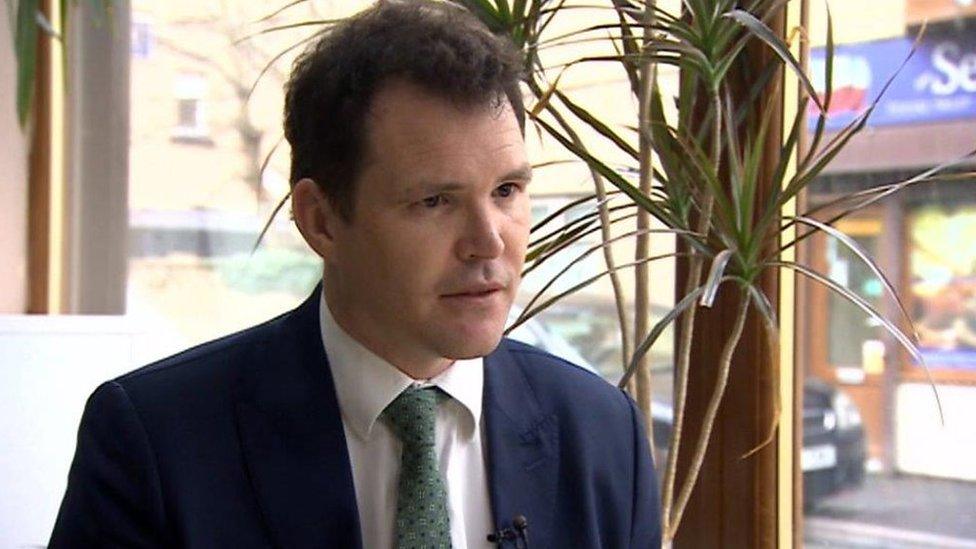Extra cash for Welsh buses but services still face cuts
- Published

The Bus Emergency Scheme has supported bus firms during the pandemic
Welsh bus companies have been told they will get more funding to replace Covid-era emergency cash that ends in the summer.
But Labour's transport minister says it would not be enough to save all services.
Lee Waters said he was offering "an extra £20m" from unspent bus pass cash.
Bus firms have been relying on government subsidy to make up for lost passenger revenue since Covid started.
The Bus Emergency Scheme (BES), due to end in the spring, had already been extended to July.
The industry has warned a large number of services would need to be scrapped once it ends.
Passenger numbers have not recovered to pre-Covid levels, particularly among older bus pass users.
It is not confirmed how the new scheme to replace BES will work, but Mr Waters said regional planning teams will look at which routes were a priority for funding.
Industry body, the Confederation of Passenger Transport, "urgently" called on ministers to clarify their "exact funding position to allow the sector to swiftly work with local authority partners to protect services, minimise disruption and safeguard jobs".
Mr Waters said in February that money was not available to keep the BES scheme going.
His comments, warning of a "skeleton services", coincided with a roads review that saw all major road projects in Wales scrapped, which Mr Waters was also responsible for.
The two announcements prompted unusual public criticism of a Welsh minister by members of his own Labour Party.
Speaking in the Senedd on Tuesday, Mr Waters said the emergency funding has been a lifeline for the industry "but it has had the impact of preserving the pattern of services that existed before the lockdowns".
"Travel behaviour has now changed: there are fewer people using buses and trains, and the times of day they are using them has also changed. There are fewer commuting journeys and more leisure journeys.
"We therefore do not want to keep running a pattern of services that no longer reflect demand or need."
He told the Senedd that "an extra £20m was being put on the table" - part of £46m to fund what is left of BES, its yet-to-be confirmed successor, and for Traws Cymru regional services.
The BES itself was worth roughly £48m.
The £20m came from an "underspend" from the bus pass budget, which is ordinarily paid to companies according to how much the bus passes are used.
Because demand is down - the minister said it was 60% of what it was in the past - companies have been getting less of the money.
Ministers will also now raise the level of money handed out when bus pass users use services by 10.1%, to reflect increasing costs.

Lee Waters said the money that is being offered by the Welsh government "falls short"
However Lee Waters said the extra £20m "falls short of the figure that local authorities and the industry required to keep every single service as is now". He suggested an extra seven to nine million would be needed.
"We simply don't have that money... we've decided to prioritise a number of other pressures that we think are important."
Mr Waters said there should be "stability" in the industry for the next 18 months, although he said if bus pass users return "the amount of money available becomes squeezed".
The minister did not set out what the successor to the BES will be.
But he said "regional planning teams, supported by Transport for Wales, would work with bus companies to establish which services were viable without additional financial aid, and what routes were the priority for the funding that we are able to make available".
'Still more work to do'
Asked to clarify the new arrangements, a Welsh government spokesperson said: "We've still got more work to do with local authorities and operators to agree how far we can make this funding go once BES ends at the end of the school year.
"The work the regional planning teams have done to review networks in their area will inform any further support we're able to put in place going forward."
The Confederation of Passenger Transport's chief executive, Graham Vidler, said: "We welcome the Welsh government's ongoing commitment to invest in supporting bus services. The funding recognises the value of buses to local communities and the economy. "However, it is not yet known whether the settlement can save all services in every part of Wales beyond July.
"We urgently call on the Welsh government to clarify their exact funding position to allow the sector to swiftly work with local authority partners to protect services, minimise disruption and safeguard jobs."
Plaid Cymru spokesperson for transport, Delyth Jewell, said: "While the additional funds announced today are, of course, welcome, a question remains over what happens when that funding comes to an end?
"Bus routes at risk of being cut at the end of this funding stream will remain at risk of being cut. Jobs will still be at risk, and communities could still be isolated, once that additional funding comes to an end."
Welsh Conservative shadow minister for transport, Natasha Asghar, welcomed the funding but said: "The minister's comments sounds like we will get a scaled back Labour owned bus service.
"A service that doesn't run frequently or often enough to fulfil everyone's needs. Yet he wants to ban all new road building, further restricting the ability of people to travel around Wales."
Related topics
- Published24 March 2023

- Published15 February 2023

- Published14 February 2023
